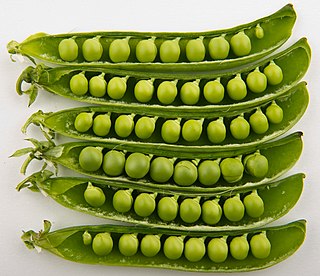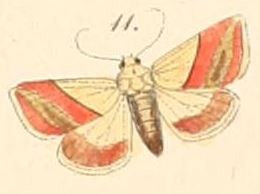See also
- Pea flower
- Pea flour
- Peanut or goober peas
Many crop plants are known as peas, particularly
and:

Pea is a pulse, vegetable or fodder crop, but the word often refers to the seed or sometimes the pod of this flowering plant species, formerly 'Pisum sativum', it has been proposed to rename the species as Lathyrus oleraceus based on the work of Schaefer et al. (2012). Each pod contains several seeds (peas), which can have green or yellow cotyledons when mature. Botanically, pea pods are fruit, since they contain seeds and develop from the ovary of a (pea) flower. The name is also used to describe other edible seeds from the Fabaceae such as the pigeon pea, the cowpea, the seeds from several species of Lathyrus and is used as a compound form for example Sturt's desert pea.

Lathyrus is a genus of flowering plants in the legume family Fabaceae, and contains approximately 160 species. Commonly known as peavines or vetchlings, they are native to temperate areas, with a breakdown of 52 species in Europe, 30 species in North America, 78 in Asia, 24 in tropical East Africa, and 24 in temperate South America. There are annual and perennial species which may be climbing or bushy. This genus has numerous sections, including Orobus, which was once a separate genus. The genus has numerous synonyms, including Pisum, the ancient Latin name for the pea.

The black-eyed pea or black-eyed bean is a legume grown around the world for its medium-sized, edible bean. It is a subspecies of the cowpea, an Old World plant domesticated in Africa, and is sometimes simply called a cowpea.

The cowpea is an annual herbaceous legume from the genus Vigna. Its tolerance for sandy soil and low rainfall have made it an important crop in the semiarid regions across Africa and Asia. It requires very few inputs, as the plant's root nodules are able to fix atmospheric nitrogen, making it a valuable crop for resource-poor farmers and well-suited to intercropping with other crops. The whole plant is used as forage for animals, with its use as cattle feed likely responsible for its name.

Vigna is a genus of plants in the legume family, Fabaceae, with a pantropical distribution. It includes some well-known cultivated species, including many types of beans. Some are former members of the genus Phaseolus. According to Hortus Third, Vigna differs from Phaseolus in biochemistry and pollen structure, and in details of the style and stipules.
Grass pea is a common name for several plants, and may refer to:

The asparagus bean is a legume cultivated for its edible green pods containing immature seeds, like the green bean. It is also known as: yardlong bean, pea bean, long-podded cowpea, Chinese long bean, snake bean, bodi, and bora. Despite the common name of "yardlong", the pods are actually only about half a yard long, so the subspecies name sesquipedalis is a more accurate approximation.
Beach pea is a common name for several plants and may refer to:

The sweet pea, Lathyrus odoratus, is a flowering plant in the genus Lathyrus in the family Fabaceae (legumes), native to Sicily, southern Italy and the Aegean Islands.
Snake bean may refer to two different species of leguminous plants:
Yellow pea is a common name for several plants, and may refer to:
Bitter vetch is a common name for several plants and may refer to:
Everlasting pea may refer to several perennial plants of the genus Lathyrus:

Etiella zinckenella, the pulse pod borer moth, is a moth of the family Pyralidae. It is found in southern and eastern Europe and in the tropics and subtropics of Africa and Asia. They have also been introduced to North America and Australia. It is usually a minor pest for many legumes, but can be a serious pest.

A crop wild relative (CWR) is a wild plant closely related to a domesticated plant. It may be a wild ancestor of the domesticated (cultivated) plant or another closely related taxon.

Vigna marina is a prostrate, creeping vine and a perennial plant. Also known as the beach pea, nanea, and notched cowpea, it is a species of legume in the family Fabaceae.
Pea beans are several types of common food plants producing beans:

Eublemma dimidialis is a species of moth of the family Erebidae first described by Johan Christian Fabricius in 1794. It is found in Indonesia, Pakistan, China, Micronesia, Nepal, Indochina, India, Japan, Sri Lanka, Taiwan, New Guinea and Australia.
Field pea may refer to: